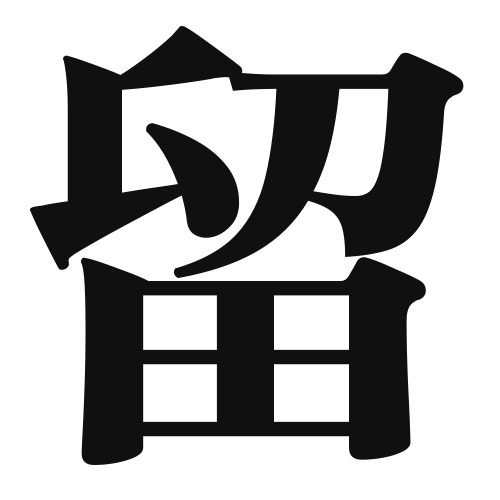1. Overview of Meaning
The kanji “留” (ryū) generally means “to stay,” “to remain,” or “to detain.” It conveys the idea of holding something in place or preventing it from moving away.
2. Formation and Radical
Formation of the Kanji: The kanji “留” is a compound character (会意文字) that combines elements to convey its meaning. It consists of the radical “亻” (person) on the left, indicating a human action, and “留” (to stop or stay) on the right, which reinforces the idea of a person staying in one place.
Radical: The radical for “留” is “亻,” which is related to actions performed by people.
3. Examples of Usage
Common Words and Phrases: Some frequently used words that include “留” are:
- 留学 (りゅうがく, ryūgaku) – studying abroad
- 留守 (るす, rusu) – absence (from home)
- 留める (とめる, tomeru) – to stop or fasten
Example Sentences in Daily Conversation:
- 彼は日本に留学しています。 (かれはにほんにりゅうがくしています。) – He is studying abroad in Japan.
- 留守の間に荷物が届きました。 (るすのあいだににもつがとどきました。) – A package arrived while I was away.
4. Synonyms and Antonyms
Similar Kanji: A kanji with a similar meaning is “止” (し, shi), which means “to stop.” However, “止” does not carry the connotation of remaining in a place as “留” does.
Antonyms: An antonym for “留” is “去” (きょ, kyo), which means “to leave” or “to go away,” indicating movement away from a place.
5. Cultural and Historical Background
Relation to Japanese Culture: The concept of “留” is significant in Japanese culture, especially in the context of education and travel, as many students go abroad for studies (留学).
Proverbs and Idioms: One common saying is “留まる者は流れず” (とどまるものはながれず), which means “Those who stay do not flow,” emphasizing the importance of remaining steadfast in one’s pursuits.
